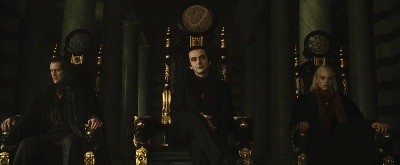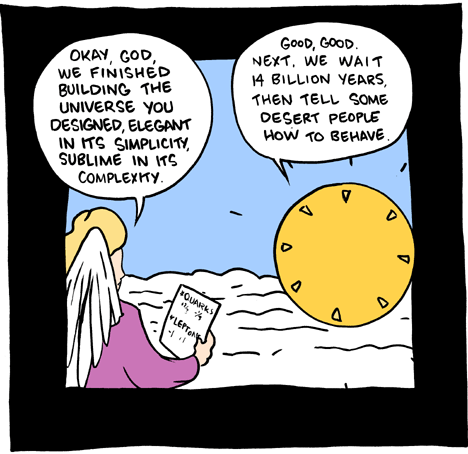Within the LDS Church, we continue to debate publicly and agonize privately over issues in LDS history (hagiography, naturalism, etc.) as well as occasionally getting our knickers in a twist over perceived or real issues in LDS leadership, both local and general. However, I think we sometimes lose perspective at just how open our history is and how self-correcting our organization is.
I write this because while doing my usual scan of the blogosphere this morning, I stumbled across a series of posts having to do with a Catholic order — the Legion of Christ — and the parallel lay organization, the Regnum Christi Movement. I claim no particular knowledge of or familiarity with either group or their respective context within the Catholic Church. But what is clear from the posting I’ve read today is that the founder of the Legion of Christ, Father Marciel Maciel, who died about a year ago and who is very much venerated by the LC and RC membership, is now acknowledged to have fathered at least one child out of wedlock (on top of earlier accusations regarding sexual abuse of young men). This appears to be quite devastating for those who have been defending Fr. Maciel’s name for some time (mostly in light of the earlier accusations). Here are some more links to discussions on this issue: here, here, here, here and here.
I write none of this to somehow attack the Catholic Church or its beliefs; to the contrary, the Catholic Church itself appears to be doing its best to deal honestly and appropriately with these issues, which really exist in organizations outside of itself. Instead, I think there are two important lessons here for us, one in terms of LDS history, the other in terms of LDS organization.
First, the sense I get from the various postings on this subject is that Fr. Maciel was revered by LC and RC members to a degree that even the most zealous Joseph Smith fan might flinch from. To quote from the New York Times article:
In Catholic religious orders, members are taught to identify with the spirituality and values of the founder. That was taken to an extreme in the Legionaries, said the Rev. Stephen Fichter, a priest in New Jersey who left the order after 14 years.
“Father Maciel was this mythical hero who was put on a pedestal and had all the answers,” Father Fichter said. “When you become a Legionarie, you have to read every letter Father Maciel ever wrote, like 15 or 16 volumes. To hear he’s been having this double life on the side, I just don’t see how they’re going to continue.”
Of course, we’re studying writings of Joseph Smith in Priesthood and Relief Society, and the LDS Church is now putting out 30 volumes of of the Joseph Smith papers. But the recent trends in “faithful” LDS historical scholarship have almost all been towards frankness (Rough Stone Rolling, David O. McKay and the Rise of Modern Mormonism, Lengthen Your Stride: The Presidency of Spencer W. Kimball) to an extent never seen before. There has been much debate in the Bloggernacle and elsewhere about “inoculation” and openness in LDS history; I think that the issues surround Fr. Maciel suggest the need to continue that openness.
Second, for all the grousing that goes on about the “Mormon hierarchy” or, on occasion, the lay nature of most LDS leadership, I think that the host of problems and the apparent divisiveness that appear to surround the Legion of Christ and Regnum Christi, particularly in light of the new information about Fr. Maciel, underscore the danger of such ancillary priesthood orders and lay organizations. While an undergrad at BYU (1970s), I remember having a discussion with one of my professors about some friends who were starting an independent scripture study group. The professor said — half-joking, half-serious — said, “You realize that’s how most apostate groups get started, don’t you?” Those friends didn’t apostatize, but I certainly ran into my share of such groups that had while I was at BYU, both as a student and as a teacher (cf. C. S. Lewis on “the lure of the Inner Ring“).
Try this thought-experiment: imagine organizing a group independent of the LDS Church explicitly (and strictly) led by Melchizedek priesthood holders, focused on the Restoration gospel, publishing its own books and materials, training its own personnel, and carrying out specific priesthood functions parallel to and independent of the Church. (Right now, depending upon your age, you may be thinking either of the Freeman Institute or one of the many Utah-based multi-level marketing corporations, but that’s not what I’m talking about.) Now imagine a lay (or, as we would say, “auxiliary”) organization specifically for families that reports to and is guided by this group, again all operating completely independent of the LDS Church itself.
Right about now, “train wreck” may be what is passing through your mind; it’s certainly what passes through mine.
We grouse at times about the quality of teaching and leadership within the LDS Church, about the arbitrary decisions often made by bishops and stake presidents, about the uniformity imposed by the Correlation Committee, and the simplicity of the “Sunday School answers”.
Yet, I think those are all either tremendous strengths or, at worst, acceptable issues that are much better than the alternatives. While we all at times feel a wish to remake the Church in our own likeness and image, it is not at all clear that this would be a good thing for anyone but us, and possibly not even for ourselves. In short, the next time you’re tempted to grouse about the Church, be careful what you wish for. ..bruce..


